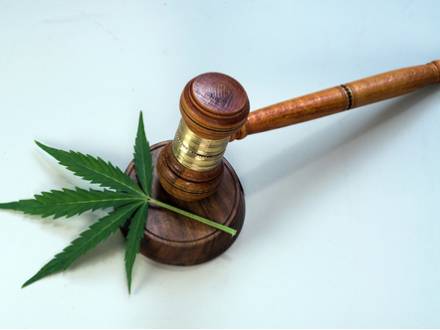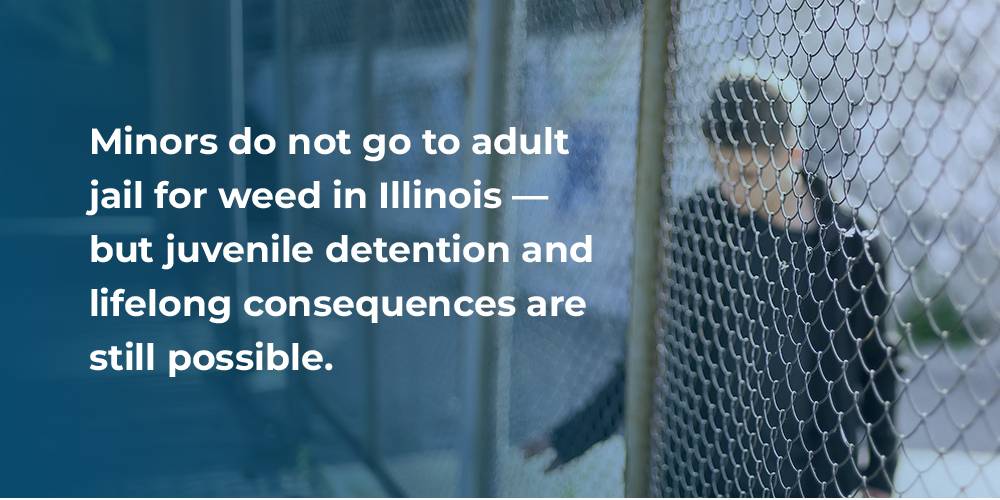
 Marijuana is legal for adults in Illinois, but the rules are very different for anyone under 21. Minors can still face serious consequences if they are caught with cannabis. When teens are arrested on marijuana-related drug charges, they are not sent to adult jail. Instead, their cases are handled through the juvenile justice system, which focuses more on rehabilitation than punishment. If your child is facing drug charges, a DuPage County, IL drug crimes defense lawyer can explain the possible penalties and build a defense to protect your child’s future.
Marijuana is legal for adults in Illinois, but the rules are very different for anyone under 21. Minors can still face serious consequences if they are caught with cannabis. When teens are arrested on marijuana-related drug charges, they are not sent to adult jail. Instead, their cases are handled through the juvenile justice system, which focuses more on rehabilitation than punishment. If your child is facing drug charges, a DuPage County, IL drug crimes defense lawyer can explain the possible penalties and build a defense to protect your child’s future.
Illinois legalized recreational marijuana for adults age 21 and older in 2020 under the Cannabis Regulation and Tax Act, 410 ILCS 705. Adults can legally buy and possess limited amounts of cannabis. But this law does not apply to minors. For anyone under 21, possession, use, or purchase of cannabis remains illegal.
The amount of marijuana involved also matters. Adults who have more than the legal limit can face civil fines or criminal charges. For minors, though, even small amounts can bring legal trouble because the state views underage possession as a risk to public safety.
Juvenile drug cases in Illinois are governed by the Juvenile Court Act of 1987, 705 ILCS 405. This law sets the rules for how the courts handle minors who are accused of crimes, including drug possession. The focus is on rehabilitation and treatment, but in serious or repeat cases, detention is still possible.
The outcome depends on how much marijuana is involved and whether the child has prior offenses. For very small amounts, usually under 10 grams, the penalty may be a civil citation, community service, or drug education classes. For larger amounts or repeat offenses, criminal charges are possible.
For adults, statute 720 ILCS 550/4 says that possession of more than 10 grams can be charged as a misdemeanor, while higher amounts or intent to deliver can result in felony charges. In juvenile court, judges have flexibility under 705 ILCS 405/5-710. They may order probation, counseling, or in more serious cases, detention.
"Jail" usually means county facilities for adults who are awaiting trial or serving short sentences. Minors are almost never sent there for marijuana offenses. The only exception is if a minor is tried as an adult in a very serious or violent case, which cannabis cases rarely are.
Juvenile detention centers are different. These are secure facilities for minors, where education, counseling, and structured programs are provided. A judge may order detention if a teen has multiple offenses, is accused of selling marijuana, or is considered a risk to public safety. Courts can also order probation or conditional discharge instead of detention. The main goal is still rehabilitation, not punishment.
Even if detention is avoided, a weed charge can affect many parts of a young person’s life:
School discipline: Schools may suspend or expel students under zero-tolerance policies, and they may be removed from sports or extracurricular activities. This can also affect future college applications if academic records show serious disciplinary actions.
Driver’s license issues: Under 625 ILCS 5/6-206, the Illinois Secretary of State can suspend or revoke a minor’s driver’s license for drug-related offenses, even if the arrest did not involve driving. Losing a license can make it harder to get to school, work, or other commitments.
College admissions and scholarships: Some colleges and scholarship programs require applicants to have a clean record, and a juvenile drug case can create barriers. Students may also face challenges when applying for federal student aid, since certain drug convictions can impact eligibility.
Employment and military service: Employers and the military often review applicants’ records. Even if records are sealed or expunged, questions may still arise. A history of drug charges can limit opportunities or delay career plans, especially in jobs that require background checks or security clearance.
First-time offenders often qualify for diversion programs, community service, or probation. But repeat offenses or cases involving sales are treated more seriously. If a minor is accused of selling marijuana, especially near a school or park, prosecutors may pursue felony charges.
Judges look at the type of offense and whether the child is making progress. If probation is violated or larger amounts of cannabis are found, detention becomes more likely. Still, courts try to balance accountability with support. Counseling, substance abuse education, and therapy are common parts of sentencing. In some counties, courts also offer drug court programs for juveniles, where judges, counselors, and probation officers work together to monitor progress closely. These programs aim to reduce repeat offenses by combining accountability with strong community support.
Being charged does not mean being convicted. Your child has rights, and an experienced defense attorney can help fight the case. Possible defenses may include:
Arguing that the police search was illegal under the Fourth Amendment.
Showing that the marijuana did not belong to your child.
Proving the amount was too small to meet the threshold for a criminal charge.
Negotiating for diversion programs focused on education and treatment.
Seeking expungement of the record once the case is closed.
A skilled lawyer can greatly increase the chances of dismissal, reduced charges, or alternatives that protect your child’s future.

While minors in Illinois are not likely to be sent to adult jail for marijuana, they can still face serious and lasting consequences. At Davi Law Group, LLC, Attorney Dion Davi, a former prosecutor, uses his experience to defend young clients against these charges. He has been recognized by Super Lawyers since 2015, previously named a Rising Star and Leading Lawyer, and holds the Elite Lawyer Award for his commitment to clients.
If your child is facing charges, do not wait to get help. Call 630-580-6373 today to speak with a DuPage County, IL drug crimes defense lawyer who understands what is at stake and will fight to protect your child’s rights and future.
 A lawyer’s time and advice are his stock and trade.
A lawyer’s time and advice are his stock and trade.